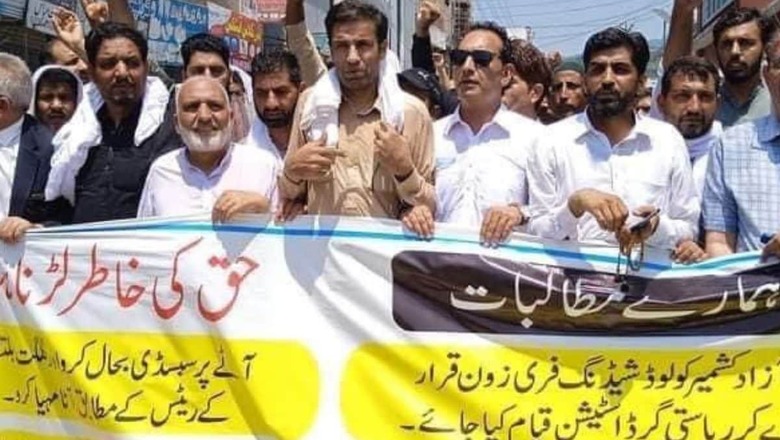
views
A statement made by Union Minister and former Army chief General VK Singh (retd) became the breaking news of the day on Monday. In reply to a question regarding Pakistan-occupied Kashmir (PoK), the General said that PoK would merge with India on its own after some time. This seems true with every passing day. In PoK and Gilgit Baltistan (GB), thousands of people are participating in protests, raising slogans in favour of opening both the Skardu-Kargil road leading into the Union Territory of Ladakh as well as the Line of Control (LoC) between PoK and Indian Union Territory of Jammu and Kashmir.
It is Pakistan’s treatment of PoK and GB that has forced people to lose all hope in Pakistan and to look at alternatives. For the past 77 years, Pakistan has weaved a false political and geographical narrative around Jammu and Kashmir. However, in recent times, the spread of information and cross-border connectivity developed due to social media has played an instrumental role in totally shattering Pakistan’s claim of being a big brother and the claim that Islam serves as a bond of unity has withered away.
Pakistan is now seen not only as an occupier but also as an exploiter of our natural resources. It steels our electricity at the rate of Rs 4.00 per unit and then sells to us at the rate of Rs 53 per unit. Heavy taxes have been imposed on electricity bills and United Nations-sanctioned subsidies on food have been cut.
For the past five months, ad-hoc subject specialists have not been paid salaries. Similarly, pensioners have not received any money for three months. The ever-increasing cost of living has made living a healthy life unsustainable in PoK. Under the circumstances, the people of PoK and GB are becoming ready to rejoin Bharat. Therefore, it is correct to say that Singh has felt the pulse of the people of PoK and GB and his statement is spot-on.
An incident that took place at the Combined Military Hospital (CMH) in Muzaffarabad, the capital of Pakistan-occupied Kashmir, is an indication of what might come next. On September 7, a young man switched on his mobile camera and began recording a conversation with military personnel, which in minutes, turned into an argument followed by an assault on the civilian. The young man had asked for medical assistance for a relative he brought to the CMH. But the military guards stopped him at the gates and did not allow him to enter the premises. They asked him to stop filming but he continued to record. In the end, another guard approached him and beat him into submission.
The military stationed in PoK has become highly anxious about civilians in recent days. This is because of the ongoing civil unrest in PoK against the sky-rocketed taxes imposed on electricity bills. Protests that began four months ago have now spread all across PoK. Schoolchildren have also joined the protest rallies, chanting slogans against the military.
On September 5, the Pakistan Federal Board of Revenue (FBR) announced that two new check posts would be established at Kohala crossing point and Mangla-Mirpur road. This has angered the population of PoK even more. Locals see this development as yet another act by Pakistan to trick them into paying customs duties worth billions of rupees.
Thousands of government employees have not received salaries for the past 20 months. Their families are starving and children have been taken off the school register due to non-payment of tuition fees. In Gilgit-Baltistan, public anger is such that hundreds of thousands of protestors are now openly asking for the GB border with India to be reopened so that they can resume trade with Ladakh.
All of this has taken political analysts other than Singh by surprise. While the International Monetary Fund (IMF) is conducting experiments to revive a long-dead Pakistan economy by applying shock therapy tactics and panic sale of the country’s assets is underway, the spirits of angry people in both PoK and GB swing like a pendulum between hope and despair. Enhanced hope can turn the tide of the history of our region in a fruitful way with the deliverance of freedom.
However, if the pendulum swings further towards despair, then the world could be on the verge of witnessing yet another religious-fanatic genocide and a tsunami of counter-revolution from which the sub-continent will not be able to recover for generations to come.
Under these circumstances, it seems all but plausible that a governing body among political activists in exile should be established to not let the pendulum of time swing too far into despair. It could be that this body becomes the decisive link between the unrest back home in PoK and GB and the revolutionary change we all have been striving for.
To change the course of history, we must take advantage of the civil unrest, which is showing all signs of snowballing into a full-fledged revolution that could end the 77 years of illegal occupation by Pakistan and bring peace to the region.
Dr Amjad Ayub Mirza is an author and a human rights activist from Mirpur in PoJK. He currently lives in exile in the UK. Views expressed in the above piece are personal and solely that of the author. They do not necessarily reflect News18’s views.
















Comments
0 comment